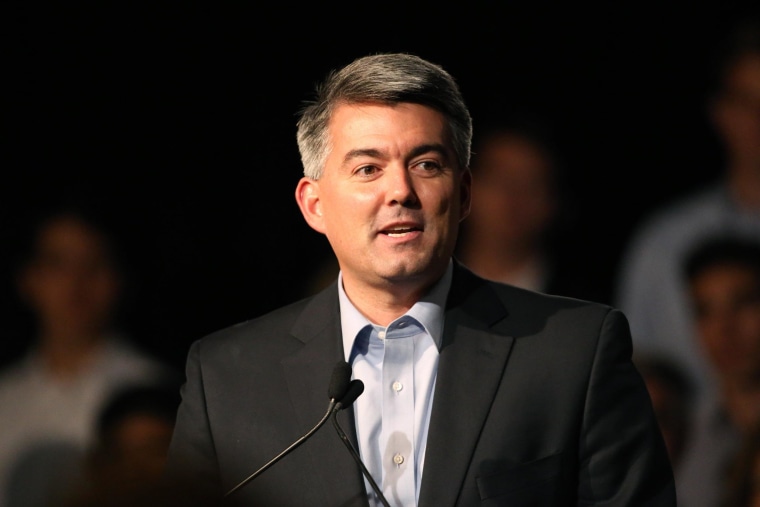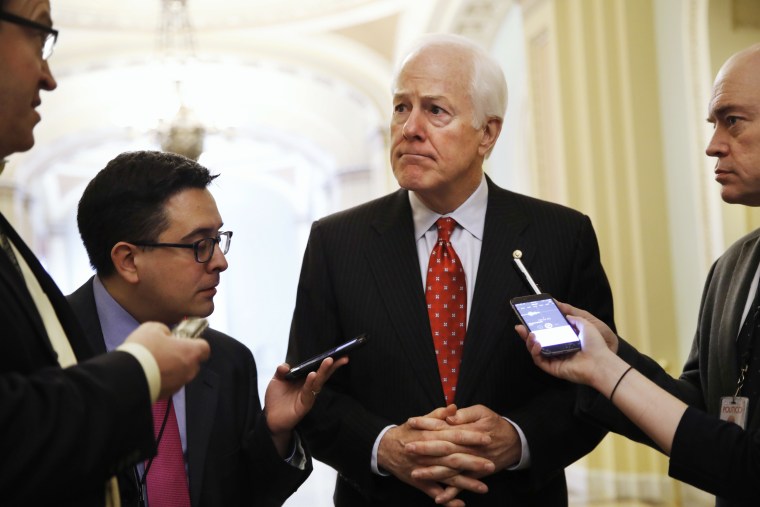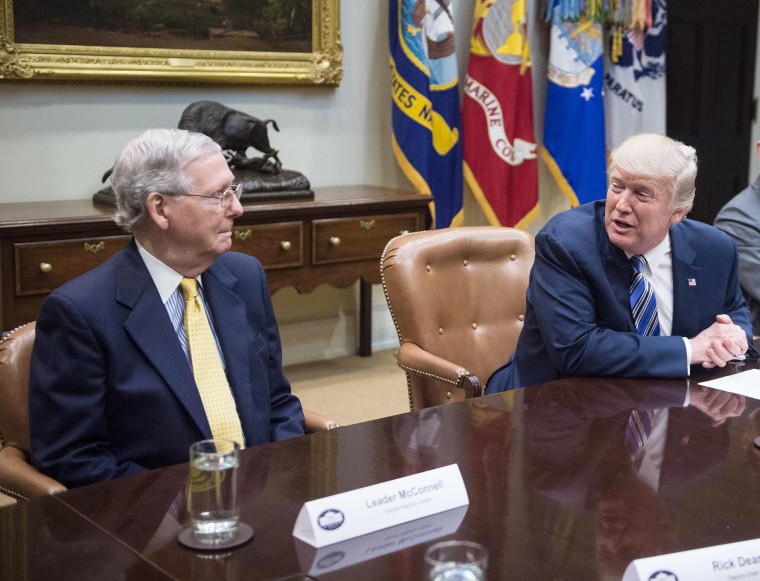WASHINGTON — President Donald Trump campaigned on his strength as an executive decision-maker — the CEO of the Trump Organization, the reality-TV star who barked "You’re fired!" at humiliated contestants and the candidate who said of the political system, "I alone can fix it."
But lately, he’s been kicking tricky issues to Congress.
In just the past couple of months, Trump's put congressional Republicans on the hook for deciding whether to slash Obamacare subsidies, tear up the Iran nuclear deal and expose hundreds of thousands of DACA recipients to deportation.
He has cast himself as an agent of action against these Obama-era policies while at times appearing to push Congress to leave them in place. By sending these thorny issues to Capitol Hill, he can stand at the other end of Pennsylvania Avenue ready to take credit for anything that works and distance himself from anything that doesn't — particularly if there's a backlash from Republican activists.
"He’s clearly torn between the pragmatic, solutions-driven guy he pitched himself as and the right-wing base he is wedded to," said Scott Mulhauser, a former Democratic Senate aide and Obama administration official. "He can’t get himself out of that box, so he throws the entire host of problems to Congress and says 'you fix it.'"
As a result, congressional Republicans find themselves loaded down with issues that have bedeviled Washington for years — exposed to political peril whether they act or not — at a time when their party is in the throes of a civil war and they have done little to demonstrate that they can legislate on even the most basic items.
But that's what they signed up for, said Sen. Cory Gardner of Colorado.

"We’re here to make politically difficult decisions," said Gardner, who is chairman of the National Republican Senatorial Committee. "If we don’t, then we’ll continue to see problems not being solved."
And Republicans in Congress can hardly complain. For years, they accused President Barack Obama of overstepping his authority and making end runs around Capitol Hill. In the view of several Republicans who spoke to NBC News, Trump is righting those wrongs.
They say Obama didn't have the authority to create the Deferred Action for Childhood Arrivals (DACA) program, which stopped the deportation of children brought to the U.S. illegally by their families.
Backed up by a federal court ruling that has been stayed for the time being, they say he went too far in creating a cost-sharing reduction, or CSR, subsidy that pays health insurers without an appropriation from Congress.
And the GOP contends that the Iran nuclear deal usurped the authority of Congress to enter into treaties.

"I think the president’s done the right thing," Texas Sen. John Cornyn, the Republican whip, said of Trump’s decision to make lawmakers the deciders.
"On Iran, we know the previous president was loathe to go through the legislative process and didn’t want to do things with the Congress, when clearly this is part of our shared responsibility," he added.
While Trump attacked Obama for overreach on the same issues — a popular theme among Republicans during the Democratic president’s two terms — he also promised to be a powerful executive. And he hasn’t shied away from making policy on his own when it suits him.
For example, he has tried three times to institute a ban on travel from certain countries, his Environmental Protection Agency is rolling back an Obama-era rule that would have reduced emissions from power plants, and he just used an Executive Order to make it easier for small businesses to band together to buy into health insurance plans.
Early in the Trump administration, congressional Republicans sometimes complained that the president wasn't consulting them — or anyone else — before rolling out expansive new policies. They point to his travel ban as an example.
Trump understands the political thicket on the issues he's dumped on Congress. But it's easier for Trump if lawmakers shoulder the decision-making responsibility. And, while that might put some Republicans in a state of crisis, others see it as a chance to demonstrate that they can take power back from the executive branch and govern effectively.
"In a certain sense, congressional Republicans are like the dog that caught the car," said Michael Steel, a managing director at Hamilton Place Strategies and former aide to John Boehner, R-Ohio, when he was House speaker. "They spent the latter years of the Obama era complaining — rightly — about executive overreach. Now they are again being asked to perform their appropriate constitutional role. It's a great opportunity to rise to the occasion."
The White House did not respond to requests for comment.

